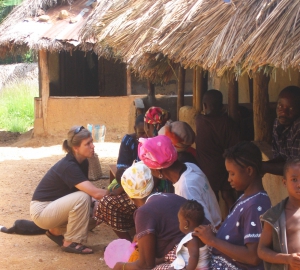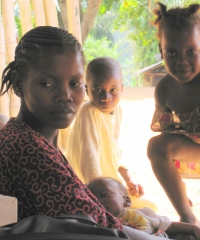Dr. Lori’s Research Addresses Maternal Health Issues in Ghana
Dr. Lori plans to modify the Home-Based Life Saving Skills program for implementation in a sub-Saharan African clinical setting.
 Clinical Assistant Professor Dr. Jody Lori has received an International Research Scientist Development Award (IRSDA) (K01) from the Fogarty International Center to fund her research entitled, “New Avenues to Increase the Use of Skilled Birth Attendants in Ghana.” Dr. Lori’s work responds to the urgent need for improved maternal healthcare in sub-Saharan Africa, specifically in the West African nation of Ghana.
Clinical Assistant Professor Dr. Jody Lori has received an International Research Scientist Development Award (IRSDA) (K01) from the Fogarty International Center to fund her research entitled, “New Avenues to Increase the Use of Skilled Birth Attendants in Ghana.” Dr. Lori’s work responds to the urgent need for improved maternal healthcare in sub-Saharan Africa, specifically in the West African nation of Ghana.
Current estimations of maternal death in Ghana are measured at 560 per 100,000, and are contributed in part to low rates of support from skilled attendants during birth. While 98% of Ghanaian women visit clinical settings to receive pre-natal care, less than half seek professional support during delivery. A number of barriers to accessing this care have been identified, such as transportation and financial difficulties, as well as a lack of decision-making power in the issue.
 Dr. Lori’s research aims to increase the use of skilled birth attendants during delivery, in order to improve the quality of maternal care and save millions of women’s lives. Her work aligns with the joint statement by WHO/UNFPA/UNICEF/World Bank, which states that a health worker with midwifery skills should be present at every birth. To this end, the project will progress through three stages.
Dr. Lori’s research aims to increase the use of skilled birth attendants during delivery, in order to improve the quality of maternal care and save millions of women’s lives. Her work aligns with the joint statement by WHO/UNFPA/UNICEF/World Bank, which states that a health worker with midwifery skills should be present at every birth. To this end, the project will progress through three stages.First, Dr. Lori plans to modify the Home-Based Life Saving Skills (HBLSS) program—a family focused, community-based program to reduce maternal and neonatal mortality—for use by skilled midwives in a Ghanaian clinical setting. “The model I’m starting with mobilizes communities to access maternity care,” explained Dr. Lori. “[The first step of this project] is to determine how to use that model within a clinical setting to encourage women to access care with a skilled birth attendant.”
 Second, she will establish the feasibility of the modified HBLSS program (HBLSS-M) by training skilled midwives to use the methods with the women under their care. Finally, a two-group comparison design will be used to determine whether the HBLSS-M produces a greater number of deliveries with professional midwives and improves birth outcomes.
Second, she will establish the feasibility of the modified HBLSS program (HBLSS-M) by training skilled midwives to use the methods with the women under their care. Finally, a two-group comparison design will be used to determine whether the HBLSS-M produces a greater number of deliveries with professional midwives and improves birth outcomes. Four faculty members will serve as Dr. Lori’s mentors for this career development award: Dr. Tim Johnson, chair of the U-M Department of Obstetrics and Gynecology; Dr. Richard Adanu, an OBGYN doctor in Ghana; Dr. Antonia Villarruel and Dr. Carol Boyd, both professors in the School of Nursing.
Dr. Lori’s project builds on two previous research experiences in Ghana. Under a Bill and Melinda Gates Foundation grant, she worked with an interdisciplinary team from U-M and Ghana to design an evidence-based roadmap for academic-government collaborative interventions to strengthen the training and deployment of human resources for health in Ghana. Additionally, since 2008, Dr. Lori has worked with the American College of Nurse Midwives to develop replicable methods/approaches for improving midwifery education and practice, ultimately improving patient outcomes in women’s reproductive health in Ghana.





